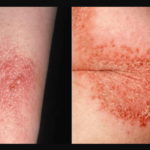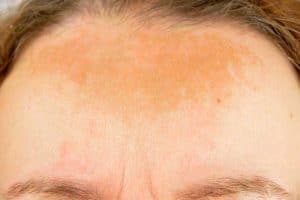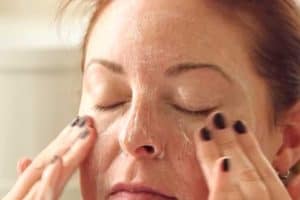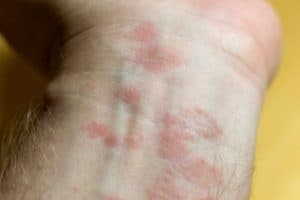People with black skin are more susceptible to hyperpigmentation than people with lighter skin tones. Hormones or trauma spikes melanin production, which can lead to hyperpigmentation. So, what is a hyperpigmentation treatment for black skin?
The most popular hyperpigmentation treatment for black skin is hydroquinone. Hydroquinone works like vitamin C by blocking the production of melanin in the skin.
You can get 2% hydroquinone over-the-counter, or you can get more potent 4% hydroquinone through a prescription.
A milder hyperpigmentation treatment for black skin is aloe vera. Aloe vera contains aloin, an organic compound that can depigment or lighten the skin. According to a study conducted in 2012, aloin can be used as a non-toxic hyperpigmentation treatment. [1]
Read on to learn more about how hyperpigmentation in black skin is treated, how it is caused, and how you can prevent this skin condition.
Also, for an effective 2% Hydroquinone product, take a look at the Ebanel Dark Spot Remover for Face:
Click here to see it on Amazon.
This fade cream reduces hyperpigmentation, age spots, freckles, and blotches for a more even, youthful, revitalized skin.
Hyperpigmentation Treatment for Black Skin
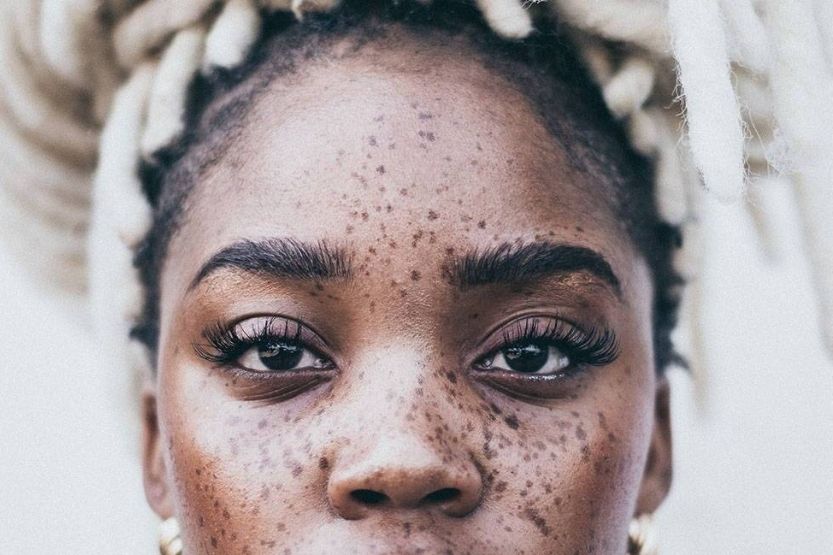
A common hyperpigmentation treatment for black skin is hydroquinone. Hydroquinone works like vitamin C by blocking the production of melanin in the skin.
Hyperpigmentation of the skin is when there is uneven discoloration or patches of dark spots. This condition is due to the overproduction of melanin within the skin’s deeper dermal layers. Hyperpigmentation is common for people with darker skin tones.
One of the popular treatments for hyperpigmentation of black skin and other dark skin is hydroquinone. It works similarly to vitamin C by inhibiting the production of melanin.
There are over-the-counter products that contain 2% hydroquinone, while prescription creams contain 4%.
Another effective product that can treat black skin hyperpigmentation is aloe vera. It contains aloin, a substance proven to be effective in lightening the skin.
Aloe vera is a natural plant; therefore, its contents are non-toxic. Pure aloe vera is applied to the affected spots before bedtime and then rinsed the following morning.
Causes of Hyperpigmentation of Black Skin
Hyperpigmentation of black skin is the result of many causes. If there are spots in your skin that are growing darker, you need to continue reading to understand why you are experiencing this skin condition.
Let us discuss these causes one by one:
1. Overproduction of Melanin
This is the fundamental cause of skin hyperpigmentation. Melanin is the substance that enables the skin to manifest its color. Therefore, if your bodily system produces excess amounts of melanin, your skin will grow darker.
Several factors can induce your system to overproduce melanin. They include hormonal changes, over-exposure to the sun’s rays, pregnancy problems, and so forth.
2. Sun Damage
This condition manifests as sunspots. They are small and flat, with colors ranging from light to dark brown. These spots usually develop on skin parts that are most exposed to sunlight.
You can see them on your face, neck, hands, and chest. They will even get darker as you overexpose your skin to the rays of the sun.
3. Post-Inflammatory Hyperpigmentation
This is a type of ‘skin trauma,’ which is skin inflammation or injury caused by hormonal disorders and other diseases. Some of the causes of PIH are contact dermatitis, psoriasis, eczema, and acne.
The trauma sustained by the skin due to these diseases will induce your body to produce higher amounts of melatonin in the affected skin area.
This will result in the development of pink, red, or dark brown spots on the skin. All kinds of skin tones can be affected by PIH, although it affects more black skin people.
4. Melasma
Changes in your hormone levels will possibly bring about melasma. Hormone levels can change during pregnancy and the intake of birth control pills.
This condition discolors the skin. It usually develops on the sides of the face or the cheeks, the skin above the lips, and the forehead.
5. Other Causes
There are still some other causes of hyperpigmentation of black skin. Among them are:
- Burns
- Bug bites
- Cuts
- Psoriasis and other skin problems
- Acne
- Skincare products adverse side effects
- Addison’s disease
- Harsh scrubs
- Waxing
Solutions and Treatments for Hyperpigmentation of Black Skin
There are effective solutions to hyperpigmentation of black skin. The correct treatment will depend on the severity of the skin discoloration and the type of skin. This condition is not really serious. But if it bothers you or other people, then you need to seek treatment.
1. Observe the Dark Spot
There are cases when the dark spot goes away after a few days or weeks. In these cases, there is no treatment required. Examples of these cases are the dark spots that developed because of pregnancy or those that appeared after pimples have healed.
In any case, you should still use sunscreen protection with a high SPF to not exacerbate the darkness of the black spots.
2. Wear Sunscreen Protection
You need to wear adequate sunscreen protection every time you go out into the sun. Research studies have revealed that this is not the usual practice of black-skinned people.
It would help if you understood that regardless of skin color, the sun’s UV rays adversely affect the skin.

The sun’s ultraviolet rays are the most responsible factors responsible for the development of dark spots on the skin – fair or dark.
They trigger excess production of melanin on the skin, resulting in the development of dark spots and the darkening of exposed skin areas.
3. Remove the Cause
There are times when dark spots on your skin develop after you have used a certain facial product. The obvious solution is not to use that product anymore. If this is the case, you need to examine the products you are using on your face and skin.
The American Academy of Dermatology says that if you remove the cause of your dark spots, they will usually go away after 6 to 12 months.
That is still relatively long, so you should still wear sunscreen protection so that the dark spots won’t get darker while you are waiting for them to fade away.
But it may take several years for darker spots to disappear. They really need to be treated as soon as possible if you want to remove them.
4. Use Natural Remedies
What is the best natural hyperpigmentation treatment for black skin? Some of the most popular natural treatments for hyperpigmentation are:
- Green tea
- Soy milk
- Turmeric
- Tea tree oil
- Aloe vera
These natural products are usually combined with other substances like olive oil and other essential oils to form a paste. The paste is then applied to the darkened spots and left there for some time to work out its wonders on the skin.
This treatment process is continued until the dark spots are removed. These natural products don’t contain toxic elements. But there is really no scientific evidence that they will lighten dark spots that developed on the skin. They may not give you the results you desire but are worth trying as there are few side effects.
5. Treat the Underlying Cause
For every health condition, there is an underlying cause. If you can find the underlying cause of the dark spots on your skin, you already have half-won the battle.
For instance, if you know that the dark spots were caused by psoriasis or acne, you have to manage these skin conditions so that the dark spots won’t appear.
All the dark spots that have developed because of these conditions will disappear in due time once you have managed and controlled their underlying causes.
6. Undergo Chemical Peels
You can also allow a qualified dermatologist to perform chemical peels on the affected skin areas. This process will not only exfoliate your skin, but it goes deeper. It usually includes microdermabrasion.
It is an abrasive process, but it is effective in solving the hyperpigmentation of your skin. However, it can also burn your skin and even produce additional changes in its pigments. This treatment is expensive since it requires several sessions before you can see the results.
7. Undergo Laser Therapy
Black skin hyperpigmentation treatment includes laser therapy. Dark spots on the skin can be removed by laser therapy. Research has indicated that this treatment is not only effective, but its results are long-lasting.
However, this is a costly process since you need several sessions before seeing the result.
There is also an unwanted consequence if the doctor is not careful in using the laser machine. The laser light will also lighten the dark spot’s surrounding skin areas if the doctor miscalculates the exact skin spot.
8. Use Retinoids
There is post-inflammatory hyperpigmentation that is the result of having pimples or acne. Prescription retinoids can treat them. These substances are derivatives of vitamin A, and they include Tazorac and Retin-A.
These substances should be used sparingly on dark and brown skin. Just the size of a small green pea will be enough to use for the entire face. It takes up to 40 weeks of using this product before you can see some results.
9. Use Skin Lightening Products
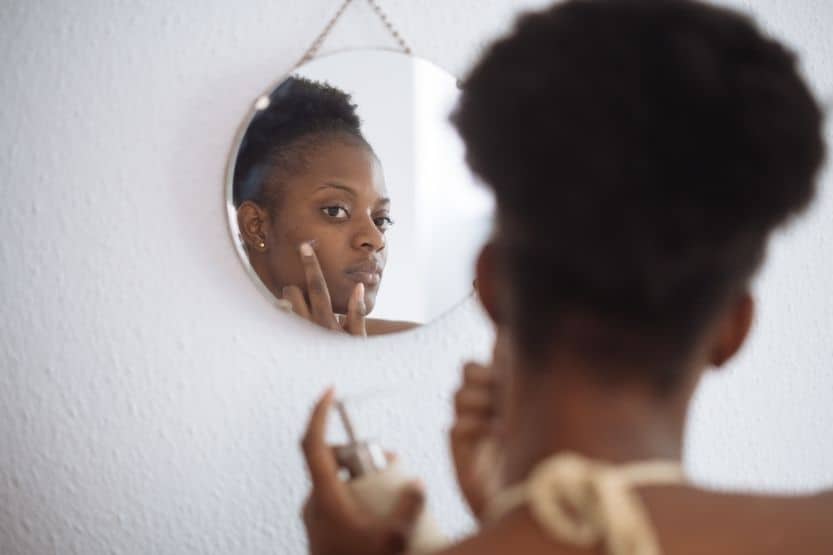
Over-the-counter skin lightening products are also effective in removing the dark spots on your skin. Among the most popular products are the following:
Hydroquinone
This substance comes in cream formulations. You can buy them from pharmacies, drug stores, and similar health outlets. It works like vitamin C by inhibiting the production of melanin in your system.
This substance blocks an enzyme responsible for the production of melanin. The results will be seen in 3 to 6 months. OTC products usually contain 2% hydroquinone, while prescription treatments contain 4%.
Differin Gel
This is another OTC medication that is actually prescribed to prevent the formation of comedones acne. Its medical name is adapalene 0.1% gel and is an anti-inflammatory agent.
It can be recommended by dermatologists to even out and lighten dark spots along with treating comedonal acne.
Vitamin C
Skincare research has shown that this substance offers protection against sun damage. It can also reduce the development of melanin and prevent hyperpigmentation.
Vitamin C can also increase the collagen levels in your system. All these benefits show that you can use Vitamin C to counter the development of dark spots on your skin.
Kojic Acid
This is also a skin lightener, although not quite effective as the other dark spot treatments. It is an acid solution that you can buy in drugstores.
A good hyperpigmentation treatment for black skin includes hydroquinone. Hydroquinone acts in the same manner as vitamin C. Both of them inhibit your skin from producing too much melanin, which causes dark spots.
Next, I’ll discuss the treatments you should not use to avoid further damage to your skin.
Avoid These Treatments
If you want to treat hyperpigmentation for black skin, stick to the safe modes of treatment. Avoid harsh treatments. Instead of solving your problem, they may even damage your skin and cause harm to your internal organs.
Avoid formulations and treatments that contain the following ingredients:
- Quicksilver
- Cinnbaris
- Mercury
- Calomel
- Mercuric
- Hydrargyri oxidum rubrum
According to the World Health Organization, creams and formulations containing mercury may cause the following conditions:
- Nerve damage or peripheral neuropathy
- Increased risk of fungal and bacterial infections
- Kidney damage
- Scarring
- Mental health problems like psychosis, depression, and anxiety
- Skin discolorations
- Skin rashes
How to Prevent Hyperpigmentation of Black Skin?
Dark spots that occur because of aging and hormonal changes can be hard to correct. But you can still make some effort to prevent them from developing.
Here are some ways you can actively prevent dark spots from developing on black skin:
- Treat psoriasis, acne, and other skin conditions right away. Don’t wait until they grow worse and develop dark spots on your skin;
- Wear sunscreen, especially if you are going out for the day. Use sunscreen with at least an SPF of 30;
- Reapply the sunscreen after every 2 hours. Apply it more frequently when you are swimming under the sun or sweating;
- Moisturize your skin every day;
- Don’t go out in the hours of 10:00 a.m. to 4:00 p.m. if the sun is up.
- Don’t use harsh skincare and exfoliating products; and
- Consult a doctor once a dark spot has formed on your skin due to taking medications or birth control pills.
Conclusion: Best Hyperpigmentation Treatment for Black Skin
Black skin hyperpigmentation is commonly treated by hydroquinone. This substance works like vitamin C by inhibiting the melanin production in your system.
It is an over-the-counter product, so you can easily obtain it in any drug or health store. OTC products usually contain 2% hydroquinone, while prescription creams contain 4% hydroquinone.
Related reading:
Pink Spots on Skin: Causes and Treatments
Yellow Spots on Skin: Causes and Treatments




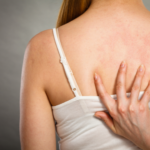
![Hot Spoon Mosquito Bite Treatment [Does It Help and How To] hot spoon mosquito bite](https://skincaregeeks.com/wp-content/uploads/2021/05/hot-spoon-mosquito-bite-150x150.jpg)

![Neutral Skin Tone Defined [and Best Colors for Neutral Skin] neutral skin tone](https://skincaregeeks.com/wp-content/uploads/2021/05/neutral-skin-tone-150x150.png)

